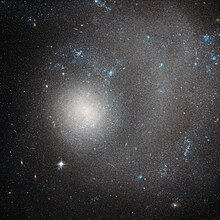NGC 5474
 Zdjęcie NGC 5474 w promieniowaniu ultrafioletowym (GALEX) | |
| Odkrywca | |
|---|---|
| Data odkrycia | 1 maja 1788 |
| Dane obserwacyjne (J2000) | |
| Gwiazdozbiór | |
| Typ | karłowata spiralna (Sc) |
| Rektascensja | 14h 05m 01,4s |
| Deklinacja | +53° 39′ 46″ |
| Odległość | |
| Przesunięcie ku czerwieni | 0,00098[2] |
| Jasność obserwowana | 10,6m |
| Rozmiary kątowe | 4,7' × 4,7' |
| Alternatywne oznaczenia | |
| UGC 9013, MCG 9-23-32, ZWG 272.23, PGC 50216 | |
NGC 5474 (również PGC 50216 lub UGC 9013) – karłowata galaktyka spiralna (Sc), znajdująca się w gwiazdozbiorze Wielkiej Niedźwiedzicy. Została odkryta 1 maja 1788 roku przez Williama Herschela[3].
Galaktyka ta znajduje się w odległości około 21 milionów lat świetlnych od Ziemi i należy do grupy galaktyk M101[1].
Zobacz też
Przypisy
Linki zewnętrzne
- NGC 5474 w serwisie SEDS.org (Revised NGC and IC Catalog) (ang.)
- NGC 5474 w bazie SIMBAD (ang.)
- NGC 5474 w NASA/IPAC Extragalactic Database (ang.)
Media użyte na tej stronie
(c) ESA/Hubble, CC BY 4.0
The subject of this new Hubble image is NGC 5474, a dwarf galaxy located 21 million light-years away in the constellation of Ursa Major (The Great Bear). This beautiful image was taken with Hubble's Advanced Camera for Surveys (ACS).
The term "dwarf galaxy" may sound diminutive, but don't let that fool you — NGC 5474 contains several billion stars! However, when compared to the Milky Way with its hundreds of billions of stars, NGC 5474 does indeed seem relatively small.
NGC 5474 itself is part of the Messier 101 Group. The brightest galaxy within this group is the well-known spiral Pinwheel Galaxy (also known as Messier 101, heic0602). This galaxy's prominent, well-defined arms classify it as a "grand design galaxy", along with other spirals Messier 81 (heic0710) and Messier 74 (heic0719).
Also within this group are Messier 101's galactic neighbours. It is possible that gravitational interactions with these companion galaxies have had some influence on providing Messier 101 with its striking shape. Similar interactions with Messier 101 may have caused the distortions visible in NGC 5474.
Both the Messier 101 Group and our own Local Group reside within the Virgo Supercluster, making NGC 5474 something of a neighbour in galactic terms.An en:ultraviolet image of NGC 5474 taken with en:GALEX. Credit: GALEX/en:NASA.


